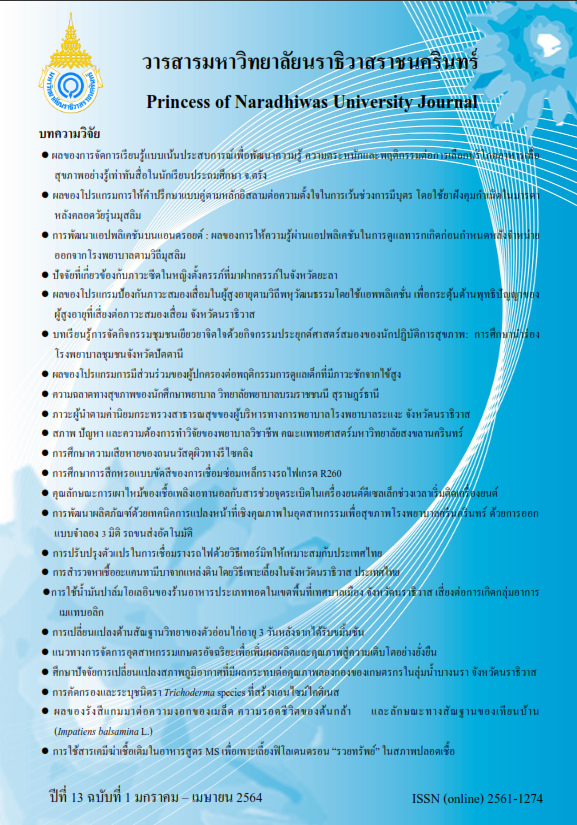Effects of Using Experiential Learning to Improve Knowledge, Awareness and Behavior of Healthy and Media Literacy Food Consumption in Prathom Suksa Students in Trang Province
Keywords:
Experiential learning, Healthy food consumption, Media literacyAbstract
This quasi-experimental study design aimed to study the effects of experience-based learning program on knowledge, awareness and behaviors of healthy consumption and media literacy food consumption of students in Prathom Suksa 4 to 6 in Muang District, Trang Province. The sample schools were randomly assigned into trial and control group which were consisted of 42 and 41 students from Prathom Suksa 4 to 6, respectively. The trial group received experience-based learning program. The control group received normal learning management. The research instrument was the program of experiential learning to create knowledge and awareness about healthy and media literacy food consumption for students in Prathom Suksa 4 to 6. Data was collected using the knowledge, awareness and behavioral questionnaires for healthy and media literacy food consumption. The reliability of the knowledge (KR-20), awareness and behavior questionnaires (Cronbach’s Alpha Coefficient) were .68, .78 and .72, respectively. Data were analyzed using descriptive statistic and t-test.
The results showed that the post-trial scores of knowledge, awareness and behavior of the trial group were higher than before the trial and higher than the control group at statistically significance p <.05. (t = 14.99, 8.01 and 10.38, respectively). The experience-based learning program is effective and should be recommended to use as a guideline to increase knowledge, awareness and behavior in healthy consumption and media literacy food consumption for students in Prathom Suksa 4 to 6.
References
Authamontree, S. (2012). Effectiveness of Experiential Health Education Instruction Model to Promote Media Literacy regarding Health Products on Internet for High School Students. Manutsayasat Wichakan Journal, 19(1), 163-176.
Best, J.W., & Kahn, J.V. (2003). Research in education. 9th ed. Boston: Allyn and Bacon.
Charoenwong, S. (2016). Political Economy of Sign Capitalism: A Postmodern Critique of Jean Baudrillard. Burapha Political Economics Journal, 4(2), 59-81.
Christ W.G. and Potter W.J. (1998). Media Literacy, Media Education and the Academic. Journal of Communication, 48(1), 5-15.
Dale, E. (1969). Audio-Visual Methods in Teaching. 3rd ed. New York: Holt, Rinehart & Winston.
Dewey, J. (1938). Experience and Education. New York: Macmillan Company.
Fedorov, A. (2003). Media Education and Media literacy: Experts ’ Opinions . In: MENTOR. A Media Education Curriculum for Teachers in the Mediterranean. Paris: UNESCO. Retrieved January 18, 2020, from https://psyfactor.org/lib/fedorov11-11e.htm.
Institute of Nutrition Mahidol University. (2012). Consumption behavior of Thai people. Retrieved January 18, 2018, from http://tcijthai.com/tcijthainews/view.php?ids=3464.
Jirapongsa-anan, P. (2013). Behavior of consumption of sign of healthy food. M.A. (Media Arts and Design). Independent Study, Kasetsart University. (In Thai).
Kamsanongsrim, P. (2009). Effects of Organizing Non-Formal Education Activities Based on Experiential Learning Concept on Sustainable Environmental Conservation of Children in Slum Communities. Master of Education Program in Non-Formal Education. Thesis, Chulalongkorn University. (In Thai).
Karusanee, S. (2009). Effects of Using a Self-Conduct in Food Consumption Enhancement Program Based on Experiential Learning Principles on Knowledge Understandinf and Food Consumption Behaviors of Third Grade Students. M.Ed. (Curriculum and Instruction). Thesis, Sukhothai Thammathirat Open University. (In Thai).
Kitpridaborisut, B. (2010). Techniques for creating data collection tools for research. 7th edition of the new revised version. Bangkok: Chamchuri Product. (In Thai).
Kohlberg, L. (1973). The claim to moral adequacy of a highest stage of moral judgment. The Journal of Philosophy, 70(18), 630-646.
Kolb, D.A. (1984). Experiential learning: experience as the source of learning and development. Englewood Cliffs, New Jersey: Prentice-Hall.
Kotchabhakdi, N. (2018). Brain and Child Development. Workshops, the use of core courses, the use of watch guides and promotion Early Childhood Development (DSPM) for Image Service Personnel (Teacher A) 26-27 March 2018 at Miracle Grand Convention Hotel Bangkok. : Retrieved May 20, 2019, From http://nich.anamai.moph.go.th/download/2561/DSPM/NK
_Brain%20and%20Child%20Development_26March2018_Final2aRอ.นัยพินิจ.pdf.
Krutasen, U. (2013). The Development of the Media Literacy Learnings Process Approach for the Youth Leader. Veridian e-Journal, 6(3), 276- 285.
Sikandar, A. (2015). John Dewey and His Philosophy of Education. Journal of Education and Educational Development, 2(2), 191-201.
Somjing, J. (2014). The Media and Information Literacy with Deviant Behavior of Youths at Risked in Trang. M.A. (Communication Arts and Information). Independent Study, Kasetsart University. (In Thai).
Srianun, S. & Adipattaranan, N. (2017). Using Experiential Language Learning to Develop English Listening-Speaking Abilities and Self-Confidence among Prathom Suksa 3 Students. Ganesha Journal, 13(1), 85-96.
Tansuwannond, J. (2015). The Relationship between Advertising Media Literacy and Consumerism Behavior of Youth in Bangkok. SDU Research Journal Humanities and Social Sciences, 11(1), 93 - 112.
Thai Health Promotion Foundation. (2017). Thai Health Master Plan 2017-2020. Retrieved January 18, 2018, from http://www.thaihealth.or.th/Books/509/แผนหลัก+สสส.+2561-2563.html.
Thinwilaisakul, C. (2012). The impact of advertising on the learning of young people case study: youth Suan-ooy community. Suan Sunandha Rajabhat University. (In Thai).
Thongdee, K. (2014). The Development on Media Literacy Levels by Using Training Package of Augmented Reality on “Media Literacy for Children and Youth”. M.S.I.Ed. Independent Study, King Mongkut's University of Technology Thonburi. (In Thai).
Wachararat, S. (2009). Development of Program Group for Educational Research Data Analysis. Bangkok : Office of the Vocational Education Commission. (In Thai).
Wirunrach, J. (2012). Factors Affecting Food Consumption Behavior of Prathom Suksa 6 Students in Schools Under the Bangkok Metropolitan Administration. M.Sc. (Public Health). Independent Study, Mahidol University. (In Thai).
Wongwichian, P. (2017). Skill and Attitude Development for Learning Research by Activity-based Learningof the Undergraduates of Bunditpatanasilpa Institute. Phimoldhamma Research Institute Journal, 4(1), 49-60.




